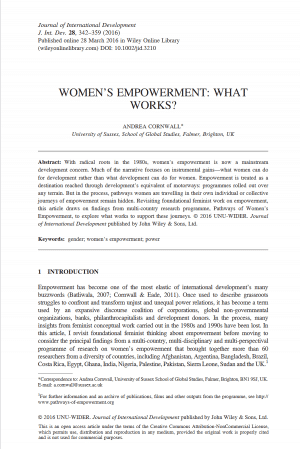
Policy highlights:
- Women’s empowerment programmes can only be transformative if the root causes of poverty and the structural basis of gender inequality are addressed, and women’s individual and collective experiences are taken into account.
- The transformative quality of empowerment programmes can be enhanced if normative beliefs about gender and power are overturned and institutions that keep women locked into positions of subordination and dependency are challenged.
- This study identifies four factors for creating transformative empowerment programmes: consciousness-raising – engaging women in critical, conscious, reflection on their own circumstances; engaging frontline workers – building equal relationships between women and programme workers to challenge paternalism and increase effectiveness; building collective power – collectivization and movement-building to enhance women’s material assets and self-respect; imagining women differently – changing representations of women (e.g. in soap operas, role models,), which has a powerful impact on women’s sense of their own power.
- Development institutions should recognize the key role of women’s rights organizations in empowering women and actively engage them in policy dialogue. Donor organizations should invest in hiring more staff to work on gender equality to improve their effectiveness on the ground.










